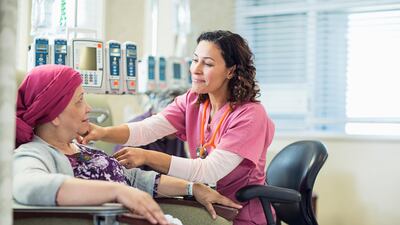The effect of Covid-19 on cancer research that could further life-saving treatments is devastating, one of Britain's top researchers said.
Cancer Research UK, the world's largest independent cancer research charity, lost about £160 million (Dh803m) in income over the past year as public donations plummeted.
This affected research projects, with the organisation unable to fund scores of schemes that it would have supported. Effects are likely to be felt for several years.
"It's been devastating," said Prof Caetano Reis e Sousa, a Fellow of the Royal Society who leads a team at The Francis Crick Institute, a centre in London with about 1,250 scientists.
"Right now, it's very bleak and I feel very sad to see this state of affairs," he said.
There are several reasons why Cancer Research UK and scores of other UK cancer charities' incomes fell.
Lockdowns made sponsored events and street fundraising much harder, while the economic downturn means the public has less money for good causes.
"We're wholly reliant on fundraising, so where people's personal finances are under pressure, we see that come through in our income," said Dr Matt Kaiser, head of careers and discovery research at Cancer Research UK.
"We've been incredibly thankful for supporters who have been able to maintain their support."
The pandemic's effects on cancer research funding are notfelt equally across the world. The UK is unusual for its scale of charitable cancer research funding. A greater proportion of research funds in the US are channelled through the government-supported National Cancer Institute, the largest and best-funded of the country's National Institutes of Health, which is less likely to have experienced shortfalls on the scale charities experienced.

Even if finance for future research projects is less affected in certain nations, disruption is significant.
Dr Kaiser said "every single centre and every single lab" in the UK was affected, with researchers forced to work from home.
"Some were able to put that time to good use writing papers and analysing data, but that only goes so far. They need to get back in the lab," he said.
"All countries to a greater or lesser extent are experiencing the same impact in terms of [centres] being shut, researchers having to shut their labs and the impact on the progress of their research.
"And some researchers will be experiencing this impact even more acutely, as they have to take on a greater share of the childcare and home responsibilities, and so we're really worried about the effect this will have on the careers of women in science in particular."
He said the effects of pausing research could extend beyond the time itself lost. For example, in some laboratories, long-term experiments or studies involving animals had to be stopped and will have to start from scratch again.
Also, some researchers were diverted from their day jobs to help with the pandemic.
"Some of my people are deployed in vaccination centres," said Prof Reis e Sousa. "Others who were doctors were [redeployed] to the NHS [National Health Service]. Even basic researchers volunteered with Covid-19 work.
"We do have people going into the lab, but mostly doing covid-related work assisting with the pandemic. It's a satisfying thing to do, but it's not really moving research forward."
Outside laboratory work, the pandemic caused the suspension of thousands of clinical trials around the globe.
Complex logistical operations involving clinical staff and scientists, trials are especially difficult because many participants have medical conditions making them vulnerable should they catch the coronavirus.
"Most cancer trials were stopped during the first wave and we're working to get them restarted," Dr Kaiser said.
"By November, most trials were back open and recruiting, but recruitment was still only about 70 per cent of pre-pandemic levels, and we expect this will have dipped again during the second wave.
"We need to focus on getting existing trials back up and recruiting well; this may limit the number of new trials we can expect to see starting for a while."
The Lancet reported that some clinical trials began delivering drugs to participants in their homes but, in other cases, trials of promising new cancer treatments were postponed – an enormous blow to patients looking for hope.
Yet the pandemic – in particular the billions spent to develop vaccines – may bring unexpected positives for cancer research.

So far, two Covid-19 vaccines made from messenger RNA (mRNA), a type of genetic material, have been approved for use. Before the pandemic, no mRNA vaccines had been approved despite three decades of research.
The current use of mRNA vaccines could, Prof Reis e Sousa suggested, move therapeutic mRNA cancer vaccines a step closer.
"The fact we have them approved for human use in another context shows we have a much better understanding of their safety, which bodes well for trials against cancer," Prof Reis e Sousa said.
"We hope they could rapidly enter the clinic because the groundwork for getting them in humans has been done."
He said the pandemic had also "revealed the enormous potential of science". People who previously may have known little about biology are now familiar with names such as T-cells and mRNA.
"Science is saving us all around the world," he said. "We should capitalise on the goodwill of people who have become sensitised to what science can deliver."


